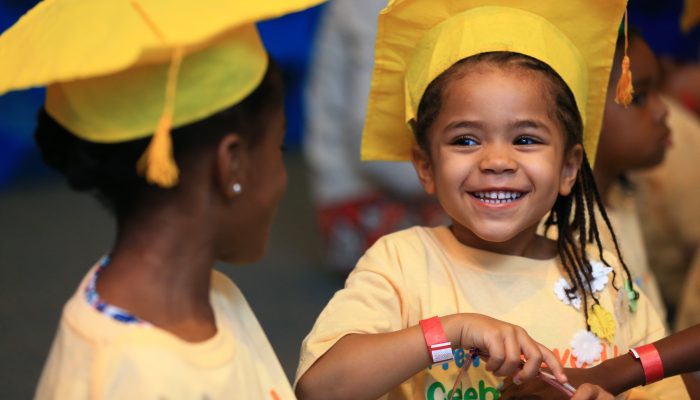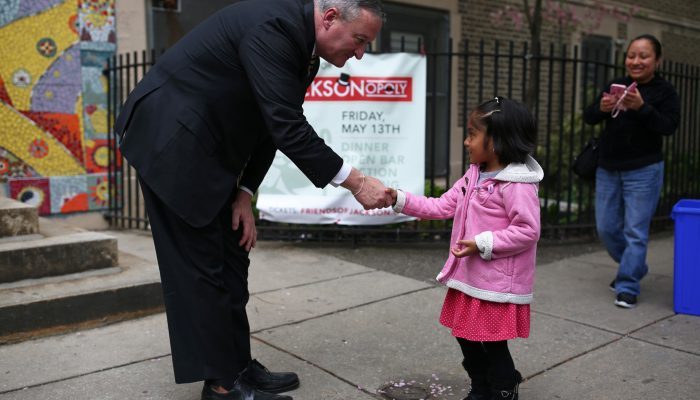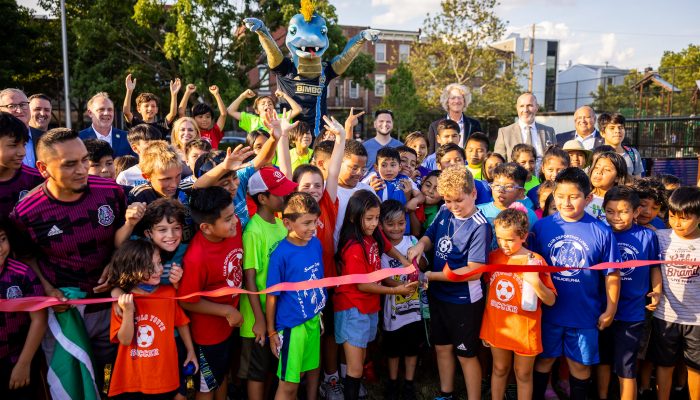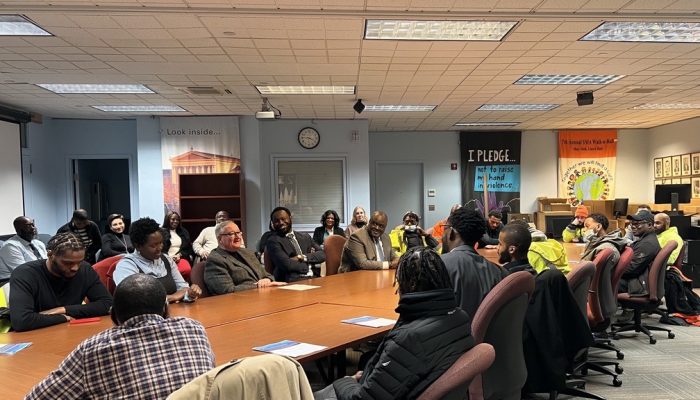It’s been two years since Mayor Kenney proposed, and City Council passed, the Philadelphia Beverage Tax to support three key initiatives:
- PHLpreK: Free, quality pre-K for 3- and 4-year-old children across Philadelphia
- Community Schools: Public schools that offer expanded medical services, after-school programming job training, and more
- Rebuild: A once-in-a-generation investment of hundreds of millions of dollars to improve recreation centers, parks, libraries, and playgrounds
Despite the successes we’ve seen in a short time, residents are hearing false information about the tax and the programs it created. This is due to an aggressive campaign by the beverage industry, which has spent tens of millions of dollars to defeat this one tax. They know that it sets a precedent for other cities, states, and countries that are pursuing similar policies.
To clear up the confusion, here’s the truth behind the five most common false claims spread by the billion-dollar beverage industry.
MYTH: The tax is killing jobs.
FACT: New groceries are opening in Philadelphia, and some owners are “not concerned” about the idea that the tax will impact their bottom line.
Some people have used the tax as a scapegoat for already-unprofitable stores that are struggling or closing. The reality is that both the beverage and grocery industries are affected by a wide range of factors, including automation or changes in buying habits. The stores have the ability to adjust their inventory to accommodate shifts in sales volumes. And it is hard to fathom that the viability of one product line should be so damaging to a grocery store with a wide variety of products.
One owner blamed the closure of a ShopRite in West Philadelphia on the beverage tax, without presenting any evidence that the tax has had any impact on sales. In fact, just a few months ago, ShopRite’s website showed a total of more than 400 job openings. And once the store closed, another grocery store chain immediately decided to move in at that location, citing that they were “not concerned” about the city’s tax on beverage distribution.
Based on that, as well as the opening of several groceries and markets in Philadelphia since the tax took effect, it’s clear that a good number of retailers have confidence in their ability to operate a profitable grocery in Philadelphia. According to the Philadelphia Tribune, a spokeswoman for the Giant supermarket chain said, “We do not believe the [soda tax] legislation will have a negative impact on our business.”
And then there’s the hard data: A study on the impact of Philadelphia’s beverage tax published in a scientific journal found that the unemployment rate in Philadelphia industries potentially affected by the beverage tax did not change in the year after the tax was implemented.
Also, just-released data from the independent data firm Nielsen shows that the number of grocery stores in Philadelphia has remained relatively constant since 2014, and the minor fluctuations in the total number since the tax took effect mirror fluctuations before the tax.
At the same time, the programs funded by the Philadelphia Beverage Tax are job creators. PHLpreK has added 275+ living-wage jobs in early childhood education. At least another 100 residents have landed employment thanks to job training they received in our Community Schools, where Community School coordinators have also connected high schoolers to jobs and career-readiness opportunities.
And Rebuild’s historic investment is funding construction projects across Philadelphia, which is sure to create jobs in the construction industry. Furthermore, Rebuild is already meeting its ambitious diversity goals to contract with women and minority-owned businesses to carry out Rebuild projects.
MYTH: The City had a high fund balance and could have paid for PHLpreK, Community Schools, and Rebuild without the tax.
FACT: The fund balance will support other key investments, including public safety and road improvements, and will allow the City to reserve funds in case of another recession.
Philadelphia’s needs are great and—even with this fund balance—our resources are limited. The Mayor’s new proposed budget makes careful and crucial investments in three areas of focus: safety and justice, inclusive growth, and quality government services. For example, we’re setting aside an extra $30 million for our violence prevention efforts over five years, another $200 million more for road paving over the next six years, and an additional $700 million over five years for the School District above what had been previously committed.
Fact is, the annual funding for the three core programs—PHLpreK, Community Schools, and Rebuild—can’t be drawn from other programs without major consequences to our city and economy, such as having to slash City services that are still recovering from cuts made during the Recession a decade ago. As we said at the start, these new programs require a new source of funding.
Keep in mind that the City actually has low fund balances compared to many major cities, and lower than what experts say is appropriate. Some experts, in fact, have warned of a looming new recession, and so the Mayor’s proposed budget sets aside some of the fund balance as a “Rainy Day” reserve in case the U.S. economy faces a downturn.
MYTH: The City isn’t even spending the money it’s collecting, so the tax isn’t needed.
FACT: All money collected as part of the Philadelphia Beverage Tax is being spent on the three core programs. In fact, in about a year, the costs of the programs will exceed collections.
We said from the start that in the first couple of years, as the programs funded by tax revenue ramp up, money generated from the tax would exceed spending. So we were prepared to see a surplus for the first few years. On top of that, we held back spending while the tax was held up in the courts for two years because of the beverage industry’s litigation.
Now that the tax has been upheld by the Pennsylvania Supreme Court, we’re back on track; the initiatives are ramping up and so is the spending. In fact, in about a year, the costs of the expanded programs will exceed tax revenue, and non-beverage tax revenues in the General Fund will cover the remaining costs.
To be clear: All money collected as part of the Philadelphia Beverage Tax is being spent on the three core programs.
MYTH: The money is sitting in the City’s General Fund so it can’t be tracked or so the Administration can spend it on other things.
FACT: Taxes go into government’s general operating funds, and the revenue is supporting only PHLpreK, Community Schools, and Rebuild.
We have said from the beginning that revenue from the Philadelphia Beverage Tax would rest in the General Fund. That is a standard budget process for taxes. It would be unusual to create a new account for a permanent tax.
We track exactly how much revenue we’ve collected from the Philadelphia Beverage Tax, we’ve been fully transparent about those collections, and we will spend every dime on the three programs supported by the tax.
MYTH: The Philadelphia Beverage Tax is regressive, disproportionately affecting lower-income communities.
FACT: The tax actually helps low-income communities that have been unfairly targeted by the beverage industry.
This claim is ironic, given that the soda industry has disproportionately advertised to low-income, minority communities for decades. As a result, those communities suffered from regressive, expensive diseases like diabetes and heart disease.
This tax will help to improve the health of those communities by giving money back in the form of free pre-k for kids, Community Schools, and renovations of neighborhood recreation centers, parks, libraries, and playgrounds. In fact, two-thirds of the first 60+ Rebuild projects are in high-needs neighborhoods.
In short, the beverage tax is progressive because it forces the multi-billion dollar beverage industry to give a little money back to those they’ve profited off for decades—in the form of quality pre-k, community schools and parks, rec centers and libraries.
BONUS FACTS: Here are the real results of the Philadelphia Beverage Tax after only two years:
- More than 4,000 kids have already benefited from PHLpreK. We’re increasing our pre-K seats from 2,250 to 3,300 in the upcoming school year, and we’ll soon grow to 5,500 students every year.
- 12 Community Schools are up and running, with eight additional schools coming by fiscal year 2021.
- 20 Rebuild projects are already underway, and we expect that number to grow to more than 30 by summer 2019. These renovations will improve recreation centers, parks, libraries and playgrounds in neighborhoods across the city.




